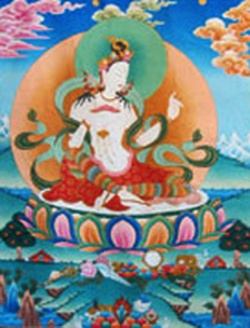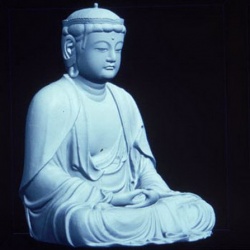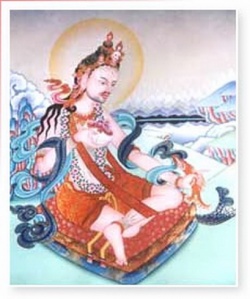Salayatana Vagga: 36: 133: Respect Worthy Dhamma
Respect Worthy Dhamma
Respect the Dhamma Worthy of Respect[1]
I HEAR TELL, once upon a time, Bhante Udayin, Kamandaya town, Brahmin Todeyya's mango grove, came a revisit'n.
Then one time a young man, a student of a Nobel Lady of the Verahaccani clan, came visiting Bhante Udayin, and there, after exchanging common courtesies, he sat down to one side and listened as Bhante Udayin taught, grounded, raised up, and made that young man happy with dhamma talk worthy of respect.
Then, after being taught, grounded, raised up, and made happy by that worthy DhammaTalk of Bhante Udayin, that young man returned to his residence with the Nobel Lady of the Verahaccani clan and said: "If it please your Ladyship, I would inform her that the beggar Udayin is presently teaching Dhamma that is helpful in the beginning, helpful in the middle and helpful at the end. He lays out the way to live the best of lives, the way to perfect and refine the best of lives, and he does so both in the spirit and the letter.[2]
"Well then, young man, please invite this Beggar Udayin for tomorrow's meal."
"Very good, My Lady.And at that command the young man returned to Bhante Udayin and said: "May Bhante Udayin accept a token of gratitude[3] as our teacher; may he accept tomorrow's meal from the Nobel Lady of the Verahaccani clan."
And Bhante Udayin accepted silently.[4]
Then Bhante Udayin, rising up in the early pre-dawn, attending to bowl and robes, set out and eventually arrived at the residence of the Nobel Lady of the Verahaccani clan, where he sat down on a "seat-made-ready".[5]
Then the Nobel Lady served Bhante Udayin with excellent food, both solid and liquid, with her own hand, until he had had his fill. And when she perceived that he had finished his meal by the fact that he had withdrawn his hand from the bowl and had given it a rinse with water supplied (hand-out bowl clean'tup), she sat down on a high seat without removing her sandals, and with her head covered with a veil, and said: "Teach me Dhamma, Beggar."
But at that[6], Beggar Udayin, said: "There will be a time for that, sister." and got up from his seat and left without saying a further word.
Well, this circumstance repeated itself a second time -- from the visit of the young man to the departure of Beggar Udayin -- and was well into it's third repetition when the Nobel Lady spoke up:
"Young Man, although you have been singing the praises of Bhante Udayin, whenever I have said: "Teach me, Dhamma, Beggar," he just says: "There will be a time for that, sister," and gets up and departs without saying a further word."
"But My Lady, were you not wearing your sandals? Did you not sit on a high seat? Did you not cover your head with a veil? And did you not say: 'Teach me Dhamma, Beggar.'? The Dhamma is greatly honored by these Aristocrats, my lady. They have great respect for the Dhamma."
"Very well, young man. Will you please invite the Beggar Udayin, in my name, to tomorrow's meal?"
"Very good, My Lady" replied the young man who then set out and did just that. And things transpired as before except that, at the end of the meal, the Nobel Lady of the Verhaccani clan removed her sandals, took a low seat, removed the veil from her head, and asked: "If it please, Bhante, under what circumstances are the Arahants able to point to the existence of good and evil? Under what circumstances are the Arahants not able to point to the existence of good and evil?"[7]
"Where there is the Eye, sister, Arahants are able to point to the existence of good and evil. Where there is no eye, Arahants cannot point to the existence of good and evil.
Where there is the Ear, sister, Arahants are able to point to the desistance of good and evil. Where there is no Ear, Arahants cannot point to the existence of good and evil.
Where there is the Nose, sister, Arahants are able to point to the existence of good and evil. Where there is no Nose, Arahants cannot point to the existence of good and evil.
Where there is the Tongue, sister, Arahants are able to point to the existence of good and evil. Where there is no Tongue, Arahants cannot point to the existence of good and evil.
Where there is Body, sister, Arahants are able to point to the existence of good and evil. Where there is no Body, Arahants cannot point to the existence of good and evil.
Where there is Mind, sister, Arahants are able to point to the existence of good and evil. Where there is no Mind, Arahants cannot point to the existence of good and evil."
At that, the Nobel Lady of the Verhaccani clan said: "Most Excellent, sir! Most Excellent Indeed! In the same way as one who sets upright that which had been upside down, or points out what had been hidden, or shows the way to one who is lost, or brings a light into the darkness so that anyone with eyes in their head that can see can see the objects there -- in so many ways has the Arahant Udayin set out The Dhamma. I, myself, Teacher Udayin, go to the Lucky Man for refuge; I, myself, Teacher Udayin, go to the Dhamma for refuge; I, myself, Teacher Udayin, go to the Order for refuge! Let the Arahant[8] Udayin look on me as a lay disciple who, from this day forth as long as this life shall last, has gone for refuge to the Buddha, The Dhamma, and the Sangha."
Footnotes
[1]Sanyutta Nikaya, Part IV, Salayatana group #133 (10). Verahaccani
[2]For Udayi's method, see: Udayi
[3]Buddhist teachers do not accept money for teaching the dhamma; but as it was a tradition at the time in other systems to pay a "teacher's fee", now and again in the Suttas you will hear about a "teacher's fee" being offered and accepted, sometimes with an artificial circumvention of the practice of not accepting fees, sometimes, as here, without raising the issue . . . most likely because of the nature of the "fee" (that is, Food). For more on the issue of accepting money for teaching, see: He Handles Gold and Silver)
[4]The usual translation: "accepted by his silence"; is unrealistic. Depending on the perception of the giver and the power of the acceptor there will have been a "silent communication" of some sort...from a nod of acceptance to an indication of no objection.
[5]Such a "seat-made-ready" in the home of a householder would have been prepared in anticipation of this event; it is a Beggar's habit to prepare an empty seat in any location where he is likely to reside for a while (even just for the afternoon's sit-down session) -- this in anticipation of the arrival of a guest or even, perhaps, a visit from The Master. This seat, also, is known as a "seat-made-ready".
[6]I am sure completely emotionally indifferent, perceiving the best method to raise up the Nobel Lady.
[7]I hear this in my usual way. The text casts this in the formula way, clearly indicating the Four Truths: "There being what, does good and evil exist; without what does good and evil not exist?" I hear the Lady asking in much more confused language -- although a sophisticated question, no doubt!
[8]Who sees how she knew? Because when asked "How do Arahants point to good and evil", Udiyi does not say he does not know, but without hesitation answers — which would make him either a fool (for speaking about something he knows nothing about) or an Arahant; and the wisdom of his answer shows he is no fool.
References:
PTS: The Book of the Kindred Sayings, Kindred Sayings on Sense, pp 77




